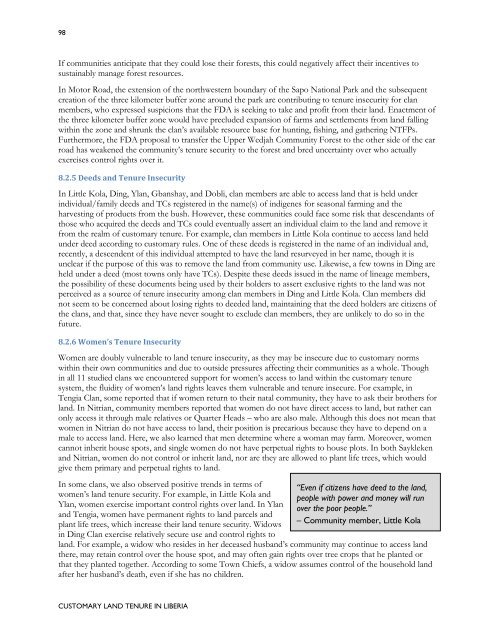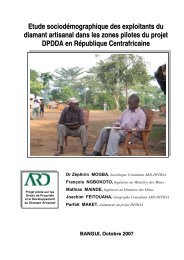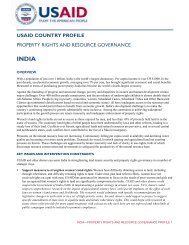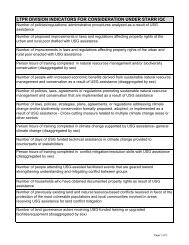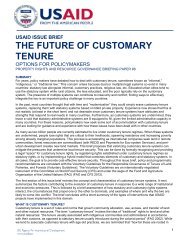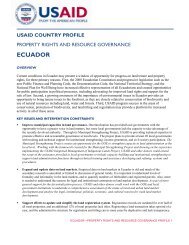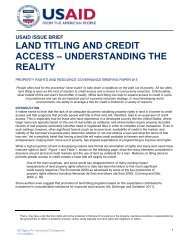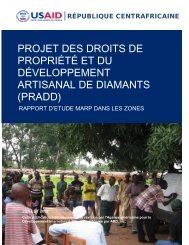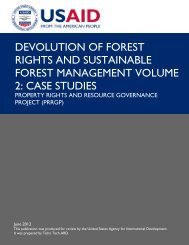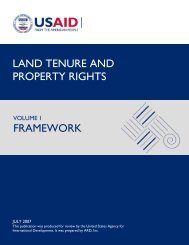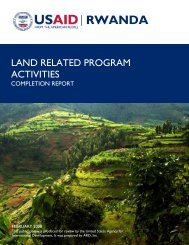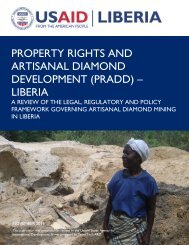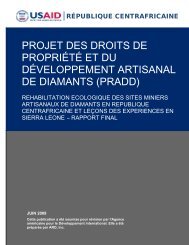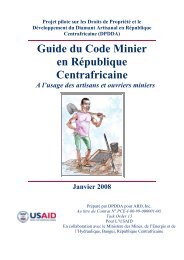Customary Land Tenure in Liberia - Land Tenure and Property ...
Customary Land Tenure in Liberia - Land Tenure and Property ...
Customary Land Tenure in Liberia - Land Tenure and Property ...
Create successful ePaper yourself
Turn your PDF publications into a flip-book with our unique Google optimized e-Paper software.
98<br />
If communities anticipate that they could lose their forests, this could negatively affect their <strong>in</strong>centives to<br />
susta<strong>in</strong>ably manage forest resources.<br />
In Motor Road, the extension of the northwestern boundary of the Sapo National Park <strong>and</strong> the subsequent<br />
creation of the three kilometer buffer zone around the park are contribut<strong>in</strong>g to tenure <strong>in</strong>security for clan<br />
members, who expressed suspicions that the FDA is seek<strong>in</strong>g to take <strong>and</strong> profit from their l<strong>and</strong>. Enactment of<br />
the three kilometer buffer zone would have precluded expansion of farms <strong>and</strong> settlements from l<strong>and</strong> fall<strong>in</strong>g<br />
with<strong>in</strong> the zone <strong>and</strong> shrunk the clan‟s available resource base for hunt<strong>in</strong>g, fish<strong>in</strong>g, <strong>and</strong> gather<strong>in</strong>g NTFPs.<br />
Furthermore, the FDA proposal to transfer the Upper Wedjah Community Forest to the other side of the car<br />
road has weakened the community‟s tenure security to the forest <strong>and</strong> bred uncerta<strong>in</strong>ty over who actually<br />
exercises control rights over it.<br />
8.2.5 Deeds <strong>and</strong> <strong>Tenure</strong> Insecurity<br />
In Little Kola, D<strong>in</strong>g, Ylan, Gbanshay, <strong>and</strong> Dobli, clan members are able to access l<strong>and</strong> that is held under<br />
<strong>in</strong>dividual/family deeds <strong>and</strong> TCs registered <strong>in</strong> the name(s) of <strong>in</strong>digenes for seasonal farm<strong>in</strong>g <strong>and</strong> the<br />
harvest<strong>in</strong>g of products from the bush. However, these communities could face some risk that descendants of<br />
those who acquired the deeds <strong>and</strong> TCs could eventually assert an <strong>in</strong>dividual claim to the l<strong>and</strong> <strong>and</strong> remove it<br />
from the realm of customary tenure. For example, clan members <strong>in</strong> Little Kola cont<strong>in</strong>ue to access l<strong>and</strong> held<br />
under deed accord<strong>in</strong>g to customary rules. One of these deeds is registered <strong>in</strong> the name of an <strong>in</strong>dividual <strong>and</strong>,<br />
recently, a descendent of this <strong>in</strong>dividual attempted to have the l<strong>and</strong> resurveyed <strong>in</strong> her name, though it is<br />
unclear if the purpose of this was to remove the l<strong>and</strong> from community use. Likewise, a few towns <strong>in</strong> D<strong>in</strong>g are<br />
held under a deed (most towns only have TCs). Despite these deeds issued <strong>in</strong> the name of l<strong>in</strong>eage members,<br />
the possibility of these documents be<strong>in</strong>g used by their holders to assert exclusive rights to the l<strong>and</strong> was not<br />
perceived as a source of tenure <strong>in</strong>security among clan members <strong>in</strong> D<strong>in</strong>g <strong>and</strong> Little Kola. Clan members did<br />
not seem to be concerned about los<strong>in</strong>g rights to deeded l<strong>and</strong>, ma<strong>in</strong>ta<strong>in</strong><strong>in</strong>g that the deed holders are citizens of<br />
the clans, <strong>and</strong> that, s<strong>in</strong>ce they have never sought to exclude clan members, they are unlikely to do so <strong>in</strong> the<br />
future.<br />
8.2.6 Women’s <strong>Tenure</strong> Insecurity<br />
Women are doubly vulnerable to l<strong>and</strong> tenure <strong>in</strong>security, as they may be <strong>in</strong>secure due to customary norms<br />
with<strong>in</strong> their own communities <strong>and</strong> due to outside pressures affect<strong>in</strong>g their communities as a whole. Though<br />
<strong>in</strong> all 11 studied clans we encountered support for women‟s access to l<strong>and</strong> with<strong>in</strong> the customary tenure<br />
system, the fluidity of women‟s l<strong>and</strong> rights leaves them vulnerable <strong>and</strong> tenure <strong>in</strong>secure. For example, <strong>in</strong><br />
Tengia Clan, some reported that if women return to their natal community, they have to ask their brothers for<br />
l<strong>and</strong>. In Nitrian, community members reported that women do not have direct access to l<strong>and</strong>, but rather can<br />
only access it through male relatives or Quarter Heads – who are also male. Although this does not mean that<br />
women <strong>in</strong> Nitrian do not have access to l<strong>and</strong>, their position is precarious because they have to depend on a<br />
male to access l<strong>and</strong>. Here, we also learned that men determ<strong>in</strong>e where a woman may farm. Moreover, women<br />
cannot <strong>in</strong>herit house spots, <strong>and</strong> s<strong>in</strong>gle women do not have perpetual rights to house plots. In both Saykleken<br />
<strong>and</strong> Nitrian, women do not control or <strong>in</strong>herit l<strong>and</strong>, nor are they are allowed to plant life trees, which would<br />
give them primary <strong>and</strong> perpetual rights to l<strong>and</strong>.<br />
In some clans, we also observed positive trends <strong>in</strong> terms of<br />
women‟s l<strong>and</strong> tenure security. For example, <strong>in</strong> Little Kola <strong>and</strong><br />
Ylan, women exercise important control rights over l<strong>and</strong>. In Ylan<br />
<strong>and</strong> Tengia, women have permanent rights to l<strong>and</strong> parcels <strong>and</strong><br />
plant life trees, which <strong>in</strong>crease their l<strong>and</strong> tenure security. Widows<br />
<strong>in</strong> D<strong>in</strong>g Clan exercise relatively secure use <strong>and</strong> control rights to<br />
“Even if citizens have deed to the l<strong>and</strong>,<br />
people with power <strong>and</strong> money will run<br />
over the poor people.”<br />
– Community member, Little Kola<br />
l<strong>and</strong>. For example, a widow who resides <strong>in</strong> her deceased husb<strong>and</strong>‟s community may cont<strong>in</strong>ue to access l<strong>and</strong><br />
there, may reta<strong>in</strong> control over the house spot, <strong>and</strong> may often ga<strong>in</strong> rights over tree crops that he planted or<br />
that they planted together. Accord<strong>in</strong>g to some Town Chiefs, a widow assumes control of the household l<strong>and</strong><br />
after her husb<strong>and</strong>‟s death, even if she has no children.<br />
CUSTOMARY LAND TENURE IN LIBERIA


